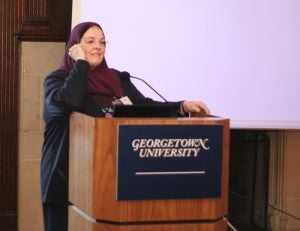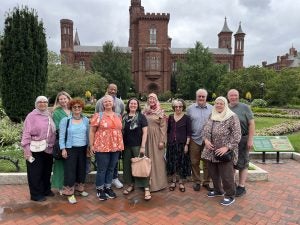
MAAS alum Susan Douglass looks back on ten years as Education Outreach Director and the four-decade legacy of CCAS’s K–14 outreach program.
By Susan Douglass
In 1990, I was accepted to the Master of Arts in Arab Studies program at CCAS after returning from living abroad for 12 years. I was drawn to the program not only because it was interdisciplin- ary and featured a strong language requirement, but also because CCAS was home to an education outreach program—founded by Zeina Azzam in the early 1980s—to help teachers deepen their knowledge of the Middle East. As a social studies teacher at the time, I understood the need for this kind of knowledge sharing and professional development within the world of education. After graduating, I applied my training at MAAS to my interest in education and be- gan working for the Council on Islamic Education in California. I conducted reviews of text- book manuscripts for major US publishing companies and contributed to policies related to national and state academic standards. Then in the late 1990s, I had the opportunity to collaborate with Zeina and the CCAS Education Outreach program giving presentations on Islam, brainstorming topics and areas of need for educators, and contributing to curriculum materials.

The beginning of my work with CCAS coincided with major changes that were underway in the world of public education. These included the de- velopment of national teaching standards for history and area studies, the adoption of standards-based education and testing at the state level, and the expansion of religious literacy education in schools. And the field of social studies was at the center of these changes. The civilization-by-civilization model of teaching that had long been the standard in world history classrooms—often referred to as “the West and the rest”—was coming to be seen as outdated; in its place there was a growing emphasis on examining multiple societies and eras in parallel, and highlighting global connections and exchanges. This so-called “New World History” model was embodied and codified in The National Standards for World History—commissioned in 1994 by UCLA’s National Center for History in the Schools.
These trends reshaped and reinforced the mission of university-based education outreach programs, such as the one at CCAS. Previously, outreach often meant advocating for inclusion of specific topics— such as the Middle East, its culture and history—in the curriculum. But after the new standards were developed, the goal of education outreach became to support school systems and teachers in implementing these broad, global requirements in a manner that reflected good scholarship.
When CCAS was, in 1997, awarded a Title VI grant from the U.S. Department of Education to form a National Resource Center on the Middle East and North Africa, Georgetown joined a net- work of area studies resource centers acting as key bridges between scholars and educators at the K-12 and community college levels. The new national standards became a benchmark for content quality and equity as our outreach program and others like it helped teachers engage with sound scholarship and current research. Most importantly, history and geography were now taught as global disciplines, creating opportunities for transregional and interdisciplinary approaches that included literature, the arts, and the full spectrum of social sciences. We moved beyond the regional limits of traditional area studies to explore “the world in the MENA and the MENA in the world.” With support from Title VI funding, Zeina pioneered programs aligned with this vision. She organized workshops, sent MAAS students into D.C.-area classrooms to teach Arabic language and culture, and led international study trips. Through her deep knowledge, grace, and persistence, she built a loyal community of teachers who regularly participated in outreach events. I contributed to her programs as a speaker and shared curriculum development work I had done with the World History for Us All project and with Unity Productions Foundation’s documentary films starting in 2000. A few years later I began conducting teacher outreach at a national level for Georgetown’s al-Waleed bin Talal Center for Muslim-Christian Understanding (ACMCU).

After completing my Ph.D. in world history at George Mason University, I succeeded Zeina as the CCAS Education Outreach Director in 2014—with the start of my tenure aligning with the beginning of a new four-year cycle of the Title VI grant. The focus of my work over the past decade has been supporting teacher access to scholarship and helping them adopt new, engaging ways to teach our subjects. In 2019–2020, amid the COVID-19 pandemic, CCAS and ACMCU agreed to merge their outreach programs. Since then, we’ve developed partnerships with major school systems in D.C., Maryland, Virginia, and beyond. Our hybrid (virtual and in-person) programs attract audiences from across the country. We collaborate with other National Resource Centers, co-sponsor programs such as the Teacher Book Club with the World Area Book Awards, host nationally promoted summer institutes, and meet monthly with NRC colleagues. Our partnerships extend to institutions such as Howard University, Smithsonian museums, George Mason’s Middle East Pedagogy Initiative, and various interfaith education groups. We’ve also contributed to state and district curriculum reviews and created professional development for both public and private schools.
Looking back on over 20 years of work, I believe that the most important factor in our success has been the consistent support of CCAS leadership and Board members. Even in an era of uncertain federal funding, I am confident that their commitment will continue. Education outreach remains the most vital link between scholars and pre-collegiate teachers, bringing academic expertise directly into classrooms. ◆
Dr. Susan Douglass has served as the CCAS K-14 Education Outreach Director since 2014. After a decade of service, she is retiring this June.
This article was published in the Fall 2024-Spring 2025 issue of the CCAS Newsmagazine.